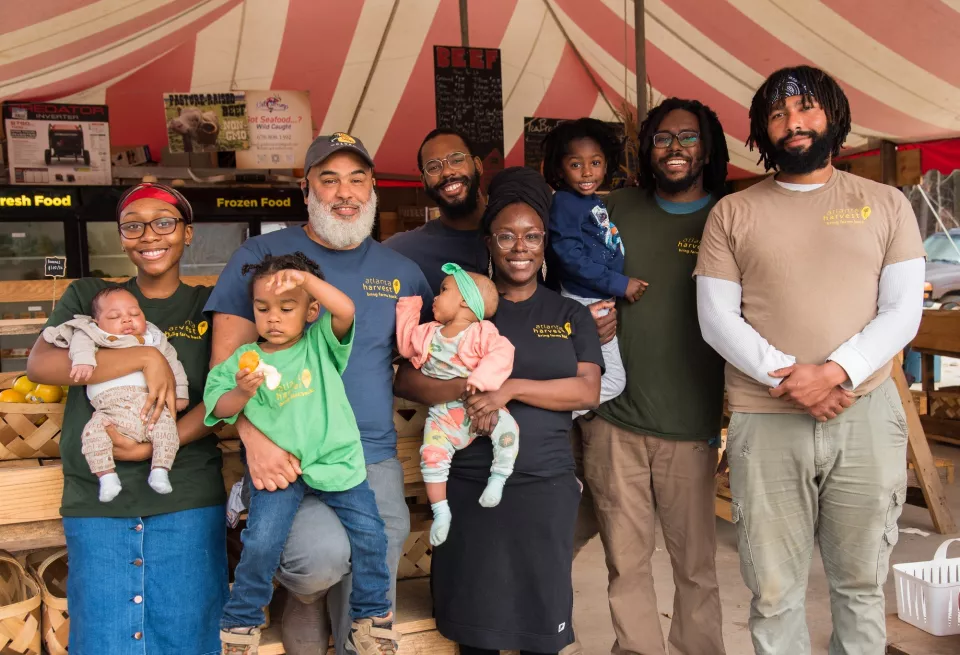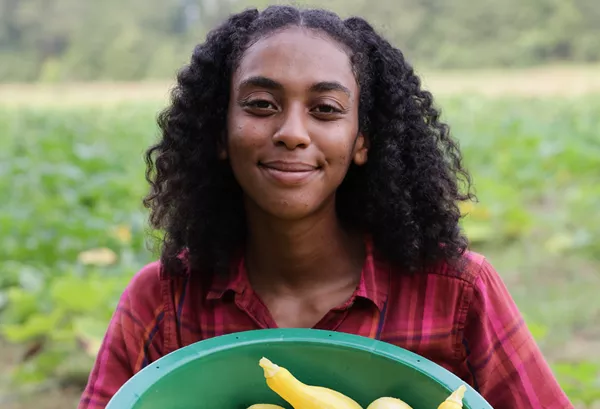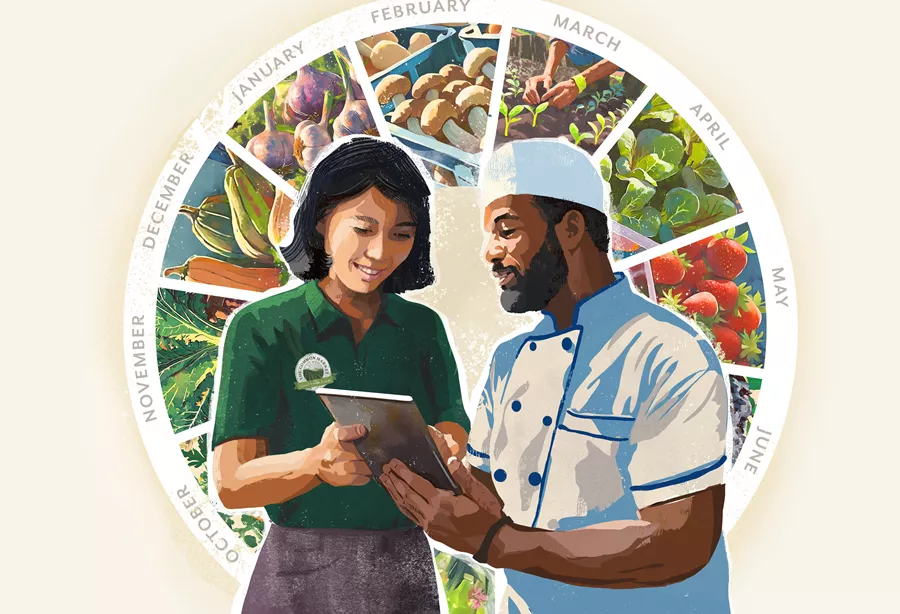Let's Connect
Our friendly and educated team is here to partner with you every step of the way. Connect today to learn of all the ways to partner with The Common Market.
Some of The Common Market’s most significant growth in 2023 stemmed from the USDA’s Local Food Purchase Assistance Cooperative Agreement Program (LFPA) and Local Foods for Schools (LFS), two programs that jump-started deeper engagement with our farmer partners new and old. Although the characteristics of the programs varied across our states, they allowed The Common Market to diversify how locally grown food could reach people who need it. The programs also created new and stable economic opportunities for our farmers, spanning multiple growing seasons and providing up to 30 months of guaranteed procurement revenue. This multi-season, yet finite, funding opened doors for many of our supply chain partners, including historically underserved growers that had limited experience working at wholesale scale.
The USDA Agricultural Marketing Service also established the Local Food for Schools Cooperative Agreement Program (LFS), which stimulated untapped school food relationships for The Common Market. With funding made available through USDA’s Commodity Credit Corporation, the funding was intended to help states deal with the challenges of supply chain disruptions brought on by the pandemic.
LFS allocated $200 million to states for the purchase of local foods to be distributed to schools as assistance. The program was created to strengthen the food system in schools by establishing a fair, competitive, and resilient local food chain. The program also aimed to expand local and regional markets, with a focus on purchasing from historically underserved producers and processors.
The Common Market was an ideal partner for state agencies working on implementing LFPA and LFS as they shared the same mission to support local, regional, and underserved producers while increasing access to healthy food in communities through schools and other institutions.
In 2023, LFS reached several states where we operate, fueling Common Market partnerships in more than 418 individual schools across New Jersey, Georgia, and Illinois. LFPA was consistent and strong with formal agreements in Georgia, New Jersey, and Texas. The procurement demand allowed us to onboard at least 20 new producers and significantly expand our purchasing from BIPOC producers by participating in these programs. For example, in the Southeast, sales from Black, Indigenous, and People of Color (BIPOC) growers in the region increased over 2,000% from 2022 to 2023.

Local Lands, a Black-owned pasture-raised cattle and poultry farm in Georgia, saw a 400% growth in commitments through the LFPA program. The increase in demand enabled the farm to scale its capacity from 400 dozen eggs per week to 2,000 dozen eggs per week.
For smaller farms, the opportunity was an eye opener:
Working with The Common Market through LFPA opened up a new door for me. I always thought wholesale production seemed out of reach for a small farmer like myself.” - Tianna Rose Neal of Starlit Root Farms
This work impacts the needs of here and now, but The Common Market is thinking long-term with its growers. Together, we identify what technical assistance (TA) our farmer partners may need to develop crop or food safety plans that enable wholesale readiness. We facilitate intentional advanced production planning, especially with smaller and/or historically underserved producers, including Smith Poultry and Provenance Farms, a women-owned operation based out of White House Station, New Jersey, and a grass-fed beef supplier.

Tianna Rose Neal of Starlit Root Farms
[LFPA] benefits not just me, but the whole concept of farming and other Black farmers that I work with. They have never had the opportunity —or even just a conversation—where their product is already sold before it is out of the ground. Farmers are used to putting out money and losing money. This opportunity is good.” — Kyle Smith, Smith Poultry, NJ
Our producers engaged in our Farm Impact Assessment, a second-party verification of production practices that mirrors the pillars of the Good Food Purchasing Program (local and community, environmental sustainability, animal welfare, and nutritious and clean). The goal of this evaluation is to collect baseline data on our supply chain and identify opportunities for improvement as well as infrastructure needs. The information allows us to confidently prepare producers for institutional sales and market products based on their attributes.
We can then make purchasing commitments to growers and issue purchase orders based on our capacity conversations and TA investments. Based on the value of their purchase orders, we can offer zero-interest loans to the growers for up to 50% of the cumulative purchase order value. We consider loans for capital improvements with the same terms.
Both programs were inspired by the need to support our country’s hardworking farms and create resilient supply chains. But, what happens once the various program periods end? How do we preserve the recent increase in capacity and investments made by our farmer partners?
Our forward commitment program (agreements made in advance with institutions, like universities and hospitals, to purchase products from values-aligned growers over an extended period, often a growing season or calendar year) is the ideal next step – ensuring farmers do not lose substantial market demand they just worked so hard to meet.
Forward commitments are agreements made in advance with institutions, like universities and hospitals, to purchase products f rom values-aligned growers over an extended period of time, often a growing season or calendar year. Although this sounds like a relatively simple concept, forward commitments reflect a major paradigm shift compared to the standard model of institutional food purchasing, which includes placing orders week to week, providing little to no stability to farmers. By making forward commitments, institutional customers harness their purchasing power and become engaged, mission-aligned investors in our regional economy and our agricultural communities, rather than mere purchasers and consumers of products.

1. Advanced and localized planning helps to sustain a resilient and dependable supply chain. This provides reassurance to institutions that the food they need is not only grown especially for them but is also grown nearby. These arrangements act as a solution to the supply chain disruptions faced by many schools, hospitals, and other institutions during the COVID-19 pandemic. If weather or equipment failure lead to a product shortage, our ability to substitute for similar products grown by a producer in a neighboring town or state becomes a reliable safety net.
2. The commitments go beyond menu planning and invoices. They can foster community building, connecting a community of consumers and chefs to the source of their food in novel ways. Our early adopters have had the opportunity to visit our farms in person, where they have met and interacted with the farmers who are responsible for growing the ingredients that will be used in student cafeterias the following season. This program helps our educational institutions establish close relationships with their food sources.
3. Forward commitments to our grower network, especially those representing BIPOC leadership and/or advanced climate-smart practices, are a strategic avenue for institutions to align with their Environmental, Social, and Governance (ESG) goals. Institutions can promote diversity and equity in their procurement practices by supporting environmentally f riendly farming methods that champion fair labor practices, and ethical animal treatment. These principles are often consistent with ESG principles. By committing to these practices, institutions can not only enhance their reputation for responsible practices but also contribute to building a sustainable and interconnected food system. This has a positive impact on both the local community and broader societal well-being.
Aramark higher education sites in the Southeast are among the f irst to step up and embrace forward commitments as part of their responsible sourcing strategies. Katelyn Repash, Aramark’s Responsible Sourcing Procurement Director, says their decision to make forward commitments relates to their goal to increase spending with small local farmers.
2023 was a transformative year for our farmer partners. They rose to the occasion to grow for our schools, for our food banks, for our communities. In the year ahead and those that follow, it will be up to us collectively to stand up for them.
"Pursuing forward commitments is an essential component in how we approach sourcing and growth opportunities with smallscale farmers. Aramark seeks to support small and underrepresented farmers, including BIPOC and women, throughout our supply chain. When we commit to consistent purchasing volumes, the farmers know they will have a guaranteed market for their produce at the price they need, and our chefs know the product is going to arrive when they planned for it.” – Katelyn Repash, Responsible Sourcing Procurement Director, Aramark
Our friendly and educated team is here to partner with you every step of the way. Connect today to learn of all the ways to partner with The Common Market.
"We love working with Common Market and consider them a valuable partner. It has enabled us to grow more crops and diversify."
— Curt Fifer, Sales Manager, Fifer Orchards